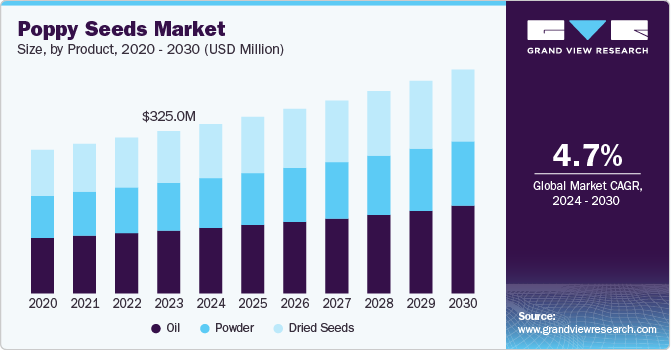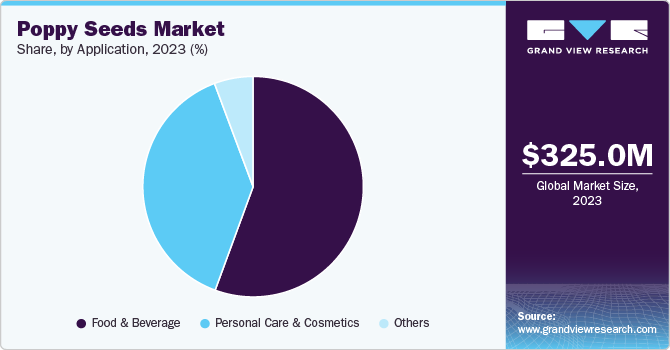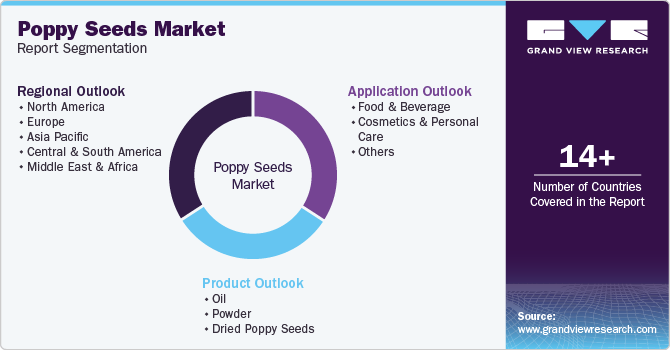- Home
- »
- Consumer F&B
- »
-
Poppy Seeds Market Size, Share & Growth Report, 2030GVR Report cover
![Poppy Seeds Market Size, Share & Trends Report]()
Poppy Seeds Market (2024 - 2030) Size, Share & Trends Analysis Report By Product (Oil, Powder, Dried Poppy Seeds), By Application (Food & Beverage, Personal Care & Cosmetics), By Region, And Segment Forecasts
- Report ID: GVR-4-68040-480-8
- Number of Report Pages: 80
- Format: PDF
- Historical Range: 2018 - 2022
- Forecast Period: 2024 - 2030
- Industry: Consumer Goods
- Report Summary
- Table of Contents
- Segmentation
- Methodology
- Download FREE Sample
-
Download Sample Report
Poppy Seeds Market Summary
The global poppy seeds market size was estimated at USD 325.0 million in 2023 and is projected to reach USD 447.8 million by 2030, growing at a CAGR of 4.7% from 2024 to 2030. Growing application markets and higher penetration of product are expected to remain key market growth drivers.
Key Market Trends & Insights
- Europe was the largest market for poppy seeds, with a revenue of USD 190 million in 2023.
- The Czech Republic poppy seeds market is expected to grow during the forecast period.
- Based on product, poppy seed oil segment was the most significant product category with market revenue exceeding USD 125 million in 2023.
- Based on application, food and beverage segment accounted for a market revenue of USD 180 million in 2023.
Market Size & Forecast
- 2023 Market Size: USD 325.0 Million
- 2030 Projected Market Size: USD 447.8 Million
- CAGR (2024-2030): 4.7%
- Europe: Largest market in 2023
The baking industry is one of the primary drivers of the poppy seed market, with rising demand for products like bread, bagels, cakes, and pastries incorporating poppy seeds. This trend is solid in Europe, where traditional recipes frequently utilize these seeds. Poppy seeds, with their high levels of linoleic acid, iron, and phosphorous, are gaining popularity among health-conscious consumers. Poppy seeds are packed with essential minerals such as calcium, magnesium, iron, and phosphorus, which are vital for bone health and muscle function. Their high calcium content supports strong bones and teeth, while iron aids in red blood cell formation, helping to prevent anemia. In addition, they contain a substantial amount of linoleic acid (omega-6 fatty acid), which is crucial for maintaining heart health when balanced with omega-3 fatty acids. This balance can help lower blood pressure and reduce harmful cholesterol levels. These nutritional benefits, coupled with the growing trend of health and wellness, are further propelling demand in the market.Poppy seeds' versatility in various cuisines enhances their appeal. They are not only used for flavor but also as a dietary supplement, leading to increased incorporation into diverse dishes globally. Their unique nutty flavor and texture add value to culinary creations, expanding their market presence. The rise of online retail channels has significantly influenced the market. Consumers increasingly prefer the convenience of purchasing poppy seeds online, which allows for greater accessibility and variety. This trend is expected to continue as consumers seek direct connections with producers and enhanced product transparency.

Although the poppy seed market is experiencing growth, numerous challenges could negatively impact market growth in the near future. Poppy seeds are derived from the opium poppy plant, which raises concerns due to its association with opium production. This connection leads to stringent regulations regarding the cultivation, trade, and consumption of poppy seeds in various regions, complicating market dynamics and limiting growth opportunities. There are significant concerns about contamination during production, processing, and distribution. Issues such as pesticide residues, mycotoxins, and foreign particles can affect product safety and quality, leading to recalls and diminished consumer trust.
Rising production costs and inflation can lead to higher prices for poppy seeds, making them less attractive compared to cheaper alternatives. This economic pressure may result in a decline in demand. In addition, there is a growing demand for other seeds. Consumers are increasingly turning to alternative seeds like chia, sunflower, and flax due to their nutritional profiles and perceived health benefits. This shift can lead to decreased demand for poppy seeds as consumers seek more affordable or accessible options.
Product Insights
Poppy seed oil was the most significant product category with market revenue exceeding USD 125 million in 2023. Poppy seed oil is rich in essential fatty acids, particularly omega-3 and omega-6, which are crucial for heart health. Additionally, it contains antioxidants like vitamin E, enhancing its appeal among health-conscious consumers seeking healthier cooking oils and dietary supplements. The food & beverage sector is a significant driver, as poppy seed oil is increasingly used in cooking, salad dressings, margarine, and mayonnaise. Its nutty flavor enhances various dishes, making it a popular choice in diverse cuisines.
There is a growing trend of natural and organic products. Consumers increasingly seek non-GMO and organic poppy seed oil options, reflecting a broader shift towards healthier eating habits. Poppy seed oil is gaining traction in the cosmetics industry due to its moisturizing and anti-inflammatory properties. It is used in skincare products such as creams and serums, appealing to consumers interested in natural beauty solutions. The Asia Pacific region is expected to witness significant poppy seed oil demand growth, driven by increasing consumer awareness of health benefits and rising purchasing power. Countries like India and China are becoming key players in both production and consumption.
The poppy seed powder segment is expected to grow at a CAGR of 4.4% from 2024 to 2030, primarily driven by its demand in the F&B and personal care segments. Poppy seed powder is gaining popularity in baking, particularly in products like bread, pastries, and snacks. The rise of gourmet cuisine and interest in traditional recipes incorporating poppy seeds contribute to this demand. Additionally, the trend of healthier eating is encouraging the use of nutrient-rich ingredients like poppy seed powder in various culinary applications. Poppy seed powder is high in essential nutrients such as iron, phosphorus, and healthy fats, which appeal to health-conscious consumers. Its benefits include aiding digestion, improving skin health, and providing energy. The growing awareness of these health benefits drives consumer interest and demand for poppy seed products.
There is a growing trend of herbal-based products and dietary supplements. Poppy seed powder is increasingly recognized for its potential health benefits, including its use as a natural remedy for insomnia and anxiety. This trend aligns with the rising consumer confidence in herbal supplements, further boosting market growth. Manufacturers are introducing innovative products that incorporate poppy seed powder into various forms, including pre-made mixes and snacks. This diversification caters to changing consumer preferences for convenience and versatility in food choices. Rising consumer interest in a plant-based diet has further augmented the growth of the poppy seed powder market. Poppy seeds are seen as a nutritious addition to vegan and vegetarian diets, providing essential nutrients often sought after by consumers looking to enhance their plant-based meals.
Dry poppy seeds was another essential product type for the market and the segment is expected to witness growth in the F&B industry. Poppy seeds are integral to various cuisines around the world. They are commonly used in baking (e.g., breads, pastries, and cakes), cooking (e.g., curries and sauces), and toppings for salads and other dishes. Their unique nutty flavor enhances the taste of food, driving demand in the culinary sector. Dry poppy seeds are rich in essential nutrients, including dietary fiber, iron, calcium, and healthy fats. Their high fiber content aids digestion and helps alleviate constipation, while iron and calcium support bone health and red blood cell production, making them appealing to health-conscious consumers.
Application Insights
Food and beverage was the most extensive application category for poppy seeds, accounting for a market revenue of USD 180 million in 2023. Poppy seeds are widely used in various culinary applications, including baking (e.g., bread, pastries, and bagels), cooking (e.g., in curries or as toppings), and even beverages. Their nutty flavor enhances the taste of dishes, contributing to their growing popularity across different cuisines. The rising trend of plant-based diets has significantly boosted the demand for poppy seeds. They are seen as a versatile ingredient that fits well into vegetarian and vegan recipes, providing essential nutrients that support a meat-free lifestyle. As global cuisines gain popularity, the use of poppy seeds in traditional dishes from regions like India, the Middle East, and Europe is also increasing. This trend is expanding the market for poppy seeds beyond their conventional uses.
Food manufacturers are experimenting with poppy seeds to create unique flavor profiles in snacks, energy bars, granola bars, and other products. This innovation is attracting consumers looking for new taste experiences. The use of poppy seeds in alcoholic beverages is also expected to boost market growth in the near future. Poppy seeds are increasingly being incorporated into craft beer and wine production, adding distinctive flavors. The development of the craft beverage market is driving demand for poppy seeds as a flavoring agent.

The use of poppy seeds in personal care applications is expected to grow at a CAGR of 4.9% from 2024 to 2030. Poppy seed oil can be used in various personal care products, including creams, lotions, hair oils, and serums. Its versatility allows it to cater to different consumer needs, from moisturizing dry skin to nourishing hair. Poppy seed oil is rich in polyphenols and vitamin E, potent antioxidants. These compounds help protect skin cells from oxidative damage caused by free radicals, reducing signs of aging and promoting overall skin health. The high levels of linoleic acid in poppy seed oil make it an effective moisturizer. It aids in maintaining skin hydration by contributing to the formation of ceramides, essential for repairing the skin barrier and preventing moisture loss.
Poppy seeds possess anti-inflammatory properties that can soothe irritated skin conditions such as eczema and dermatitis. They help reduce redness and inflammation, making them suitable for sensitive skin types.
Regional Insights
The North American poppy seed market is much smaller than Europe and Asia's but has witnessed some growth in recent years. The increase is mainly seen in baking products like bagels and pastries featuring poppy seeds. The U.S. poppy seed market was USD 35 million in 2023 and is expected to grow at a CAGR of over 4% from 2024 to 2030.
Europe Poppy Seeds Market Trends
Europe was the largest market for poppy seeds, with a revenue of USD 190 million in 2023. It is expected to grow at a CAGR of 4.7% over the forecast period. Europe is one of the largest producers of poppy seeds globally, with the Czech Republic being a leading contributor. This region accounts for significant global production, enhancing supply consistency and quality. There is high demand in countries such as the Czech Republic, Hungary, Turkey, and Germany. The Europe poppy seed market is expected to grow steadily due to increasing demand from both the food and personal care sectors. Combining traditional culinary uses and emerging health trends positions the market for sustained growth.
The Czech Republic poppy seeds market is expected to grow during the forecast period. Czech Republic is the largest poppy seed producer globally, with the majority of the product exported. Despite these large exports, the country's domestic per capita consumption of poppy is high, as the product is an essential part of the Czech culinary culture. The Czech population incorporates poppy seeds into everyday cooking, which sustains their popularity and demand across different demographics. The Czech Republic is known for producing high-quality poppy seeds that meet EU standards for low morphine content and pesticide residues. This reputation enhances consumer trust and demand both domestically and internationally.
Asia Pacific Poppy Seeds Market Trends
Asia Pacific is expected to grow at a CAGR of 5.0% from 2024 to 2030 due to growing demand from India and China. These rapidly developing economies are experiencing rising purchasing power among consumers, contributing to higher demand for poppy seeds and related products. As the middle class expands, there is a greater emphasis on health and wellness. The region is also increasing its domestic production, with countries like India having significantly expanded their area under cultivation for poppy seeds.
Key Poppy Seeds Company Insights
The poppy seeds' competitive landscape involves large global companies and numerous smaller regional players. The companies are diverse in application and operate in the F&B, personal care, and cosmetic segments.
Key Poppy Seeds Companies:
The following are the leading companies in the poppy seeds market. These companies collectively hold the largest market share and dictate industry trends.
- Solo Foods, Inc.
- Bob's Red Mill Natural Foods
- Frontier Natural Products Co-op
- Bio Nutrition Inc.
- Olivenation LLC
- Woodland Foods
- P.P.H.U. Kampol
- PROBI spol
- Bata Food
- Unifood
Recent Developments
-
In April 2024, Cognizant, a leading IT services firm, entered into a global infrastructure agreement with McCormick & Company, a major distributor of poppy seeds. This strategic partnership aims to enhance operational efficiencies and supply chain management in the poppy seed market.
-
In Jan 2024, Saco Foods announced its acquisition of Solo Foods, LLC from Sokol & Company. This acquisition is expected to broaden Saco's product offerings in the specialty food ingredient sector, including poppy seeds.
-
In December 2023, Olam Agri, a prominent producer of poppy seeds, joined two global initiatives focused on improving agricultural sustainability. This move aligns with the growing consumer demand for sustainably sourced food products.
Poppy Seeds Market Report Scope
Report Attribute
Details
Market size value in 2024
USD 339.0 million
Revenue forecast in 2030
USD 447.8 million
Growth rate
CAGR of 4.7% from 2024 to 2030
Actuals
2018 - 2023
Forecast period
2024 - 2030
Quantitative units
Revenue in USD million and CAGR from 2024 to 2030
Report coverage
Revenue forecast, company ranking, competitive landscape, growth factors, and trends
Segments covered
Product, application, region
Regional scope
North America; Europe; Asia Pacific; Central & South America; Middle East & Africa
Country scope
U.S.; Canada; Mexico; Germany; Czech Republic; Turkey; Hungary; Poland; China; Japan; India; Indonesia; South Korea
Key companies profiled
Solo Foods, Inc.; Bob's Red Mill Natural Foods; Frontier Natural Products Co-op; Bio Nutrition Inc.; Olivenation LLC; Woodland Foods; P.P.H.U. Kampol; PROBI spol; Bata Food; Unifood
Customization scope
Free report customization (equivalent up to 8 analysts working days) with purchase. Addition or alteration to country, regional & segment scope.
Pricing and purchase options
Avail customized purchase options to meet your exact research needs. Explore purchase options
Global Poppy Seeds Market Report Segmentation
This report forecasts revenue growth at the global, regional, and country levels and provides an analysis of the latest industry trends and opportunities in each of the sub-segments from 2018 to 2030. For the purpose of this study, Grand View Research has segmented the global poppy seeds market report based on product, packaging, and region:

-
Product Outlook (Revenue, USD Million, 2018 - 2030)
-
Oil
-
Powder
-
Dried Poppy Seeds
-
-
Application Outlook (Revenue, USD Million, 2018 - 2030)
-
Food & Beverage
-
Cosmetics & Personal Care
-
Others
-
-
Regional Outlook (Revenue, USD Million, 2018 - 2030)
-
North America
-
U.S.
-
Canada
-
Mexico
-
-
Europe
-
Germany
-
Czech Republic
-
Turkey
-
Hungary
-
Poland
-
-
Asia Pacific
-
China
-
Japan
-
India
-
Indonesia
-
South Korea
-
-
Central & South America
-
Middle East & Africa
-
Frequently Asked Questions About This Report
b. The global poppy seeds market size was estimated at USD 325.0 million in 2023 and is expected to reach USD 339.0 million in 2024.
b. The global poppy seeds market is expected to grow at a compound annual growth rate of 4.7% from 2024 to 2030 to reach USD 447.8 million in 2030.
b. The food & beverage segment dominated the poppy seeds market and held the largest revenue share of 55.5% in 2023.
b. Some key players operating in the poppy seeds market include Solo Foods, Inc., Bob's Red Mill Natural Foods, Frontier Natural Products Co-op, Bio Nutrition Inc., Olivenation LLC, Woodland Foods, P.P.H.U. Kampol, PROBI spol, Bata Food, Unifood
b. Key factors driving the poppy seeds market growth include the growing application of poppy seeds in bread, bagels, cakes, and pastries and the growing popularity among health-conscious consumers, and higher penetration across pharmaceutical applications.
Share this report with your colleague or friend.
Need a Tailored Report?
Customize this report to your needs — add regions, segments, or data points, with 20% free customization.

ISO 9001:2015 & 27001:2022 Certified
We are GDPR and CCPA compliant! Your transaction & personal information is safe and secure. For more details, please read our privacy policy.
Trusted market insights - try a free sample
See how our reports are structured and why industry leaders rely on Grand View Research. Get a free sample or ask us to tailor this report to your needs.










